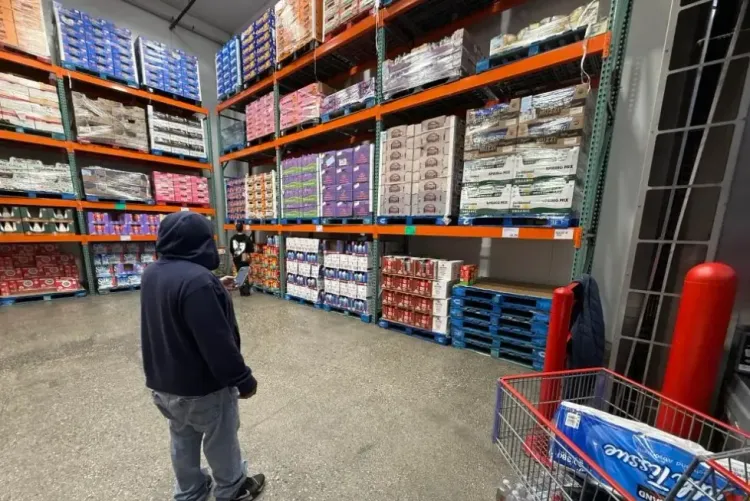Nationwide Egg Purchase Limits Surge Amid Bird Flu Woes

Synopsis
Key Takeaways
- Egg purchase limits are being enforced across various US grocery chains.
- California shoppers are facing significant restrictions and rising prices.
- Social media showcases the rush for eggs, revealing consumer anxiety.
- Over 150 million poultry birds have been culled due to avian flu.
- The USDA predicts a 20% increase in egg prices by 2025.
California, Feb 13 (NationPress) An increasing number of US grocery chains are placing limitations on egg purchases as bird flu outbreaks persist in disrupting supplies. Shoppers in California are feeling the effects keenly, facing purchase restrictions and early morning lines.
At a Costco located in San Jose, California, the store has been capping purchases at three cartons per customer since Saturday, as stated by a store employee named Pauline. By late morning on Tuesday, only 15 cartons remained -- all of which were higher-priced organic brown and green eggs, with no white eggs available. The store has displayed a sign at the entrance to announce the sales limit, effective Tuesday.
"You have to arrive early to ensure you can buy eggs," shared Marcie Lopez, a customer at the store, with Xinhua news agency, highlighting that eggs are becoming increasingly expensive and harder to find this year.
"No eggs, no eggs, no eggs," remarked a clerk at another Costco in Azusa, California, to those who were waiting in line just after the store opened on Monday morning.
"It's shocking; we arrived so early, yet we still couldn't purchase any eggs," said a customer named Luna, speaking to Xinhua.
The escalating prices and barren shelves are heightening consumer anxiety. Social media platforms, including TikTok, are inundated with videos of shoppers racing to grab eggs, often clearing freshly stocked shelves within minutes. One viral clip from a Costco store illustrated eggs being snatched up in under 10 minutes, with customers seizing dozens.
Across the nation, retailers are urgently managing dwindling supplies. Trader Joe's has instituted a limit of one dozen eggs per customer each day at all of its more than 600 locations in the US.
"Given the continuing challenges with egg supply, we kindly request that you limit your purchase to 1 dozen of any kind," stated a Trader Joe's store in Monrovia on a sign for customers shopping for eggs, while adding, "We hope to have sufficient supply soon. Until that time, we appreciate your understanding."
Whole Foods has restricted purchases to three cartons per shopper, while Kroger limits customers to two dozen eggs per visit.
Other significant chains are adopting similar measures. Sprouts has set a four-dozen cap per visit, Giant Eagle requests that customers limit purchases to three cartons per transaction, and Market Basket stores in Massachusetts are confining egg purchases to two cartons per family.
In California, a Safeway supermarket in Santa Clara has restricted customers to two dozen per visit for the past month. An employee, who identified himself as John, explained to Xinhua that the store does not receive daily egg shipments, instead restocking twice a day -- at 7 a.m. and noon -- to spread out availability. Despite these efforts, eggs usually sell out by late afternoon.
The restrictions arise as highly pathogenic avian influenza (HPAI) continues to affect egg-laying flocks across the nation. The US Department of Agriculture (USDA) Eggs Markets Overview report published on Friday indicates that over 150 million poultry birds have been culled to combat the H5N1 virus, leading to soaring egg prices and dwindling supplies.
The national trading price for graded, loose, white large shell eggs has climbed to 7.34 US dollars per dozen, while the wholesale price in California for cage-free large shell eggs has reached 9.11 dollars per dozen. The report anticipates that the supply situation will remain tight, with scant hope for immediate improvement.
Consequently, many grocers are curtailing promotional activities and instituting purchase restrictions to extend existing supplies.
"Due to the current market conditions, egg prices have risen. We apologize for any inconvenience," stated an Aldi store in Monrovia on a sign inside the store, adding that "due to supply challenges, eggs are restricted to 2 per customer."
Some retailers are keeping prices high to temper demand, while egg product manufacturers have increased their demand, resulting in sharp price hikes in the spot market.
The USDA forecasts that egg prices will rise approximately 20 percent by 2025, significantly outpacing the expected 2.2 percent increase in overall food prices. Prices in December 2024 were already 36.8 percent higher than the previous year, according to USDA data.
Saloni Vastani, an associate professor of marketing at Emory University, informed USA Today that the shortage is being aggravated by consumer behavior.
"Egg prices are rising due to the avian flu, which is prompting people to purchase more eggs than usual as they anticipate higher prices and reduced grocery store stock," Vastani elucidated.
The effects have also reached restaurants. Waffle House, which serves around 272 million eggs each year, recently introduced a 50-cent surcharge per egg across its roughly 2,100 US locations.










